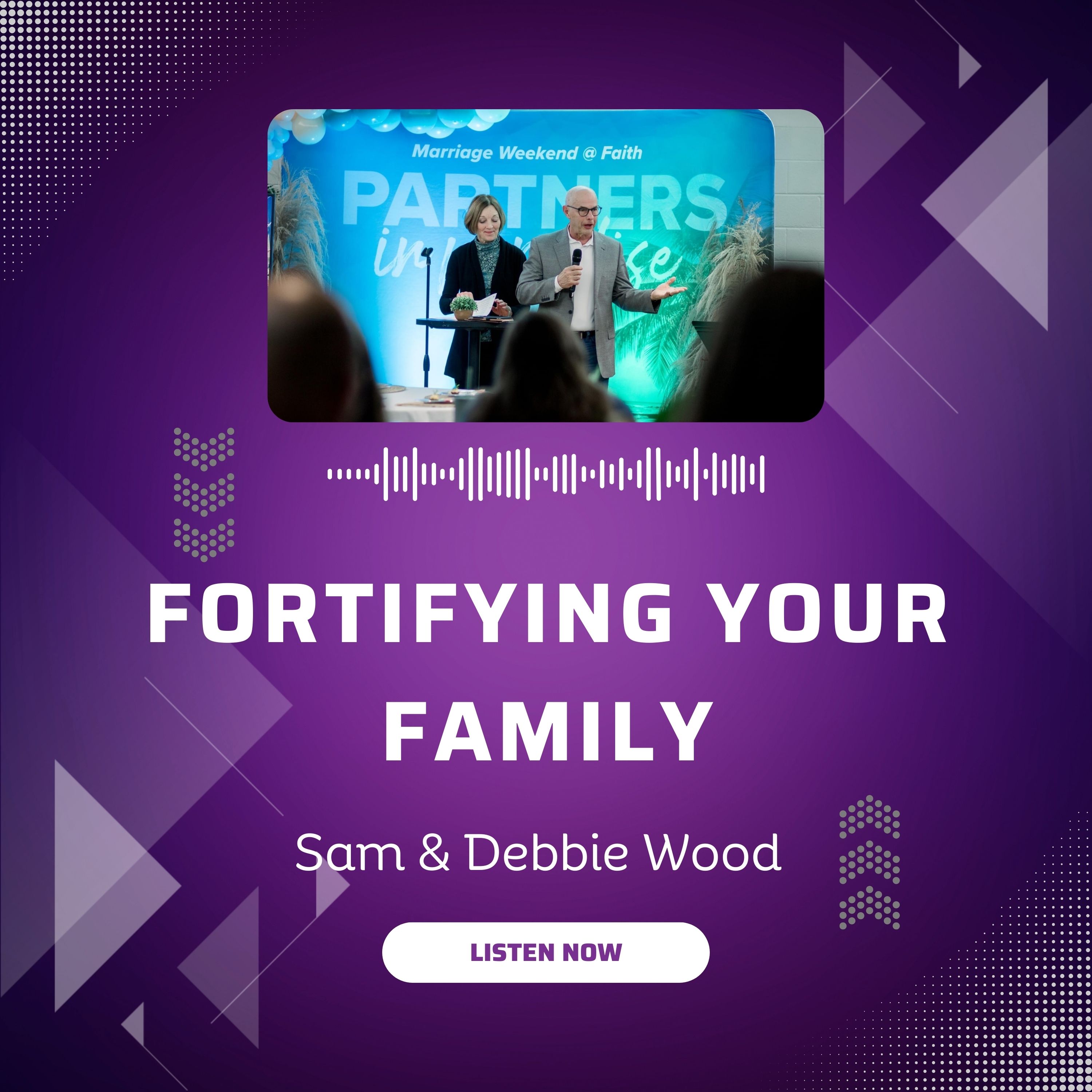Honoring Your Mother | Part 2
In this episode, we continue uncovering the powerful legacy of Ruth—a godly woman who teaches us that honoring our mothers goes far beyond words. In Part 1, we saw how Ruth honored Naomi through the life she lived. Now, we dive deeper into her story to discover two more profound ways Ruth cared for her depressed mother-in-law. Her actions offer timeless lessons in love, loyalty, and godly honor that still speak to us today.
Checkout these other Family Fortress Ministries Podcasts:
TIME FOR THREE daily couples devotional: https://time-for-three.captivate.fm/listen
FORTIFYING YOUR FAMILY: https://fortifying-your-family.captivate.fm/listen
MINISTRY WEBSITE: https://familyfortress.org/
DONATE to Family Fortress Ministries: https://familyfortress.org/donate
Transcript
Welcome to the Fortifying youg Family podcast.
Speaker A:It can be daunting to navigate through an anti marriage and family culture.
Speaker A:Our teacher will expound biblical principles to help fortify our families and keep these sacred institutions strong.
Speaker A:And now, here's this week's teaching from Sam Wood.
Speaker B:We've looked at three ways, very briefly that Ruth honored her mother in law by the life she lived by respecting her, by her faith and by her humility.
Speaker B:But notice another way that she honors her.
Speaker B:She also honors her by the loads that she's lifting.
Speaker B:Let me just spend a minute on this this morning.
Speaker B:Ruth is listening.
Speaker B:This is so important.
Speaker B:Ruth is not lazy.
Speaker B:She's not a young girl that's lazy.
Speaker B:She's industrious.
Speaker B:Look at verse two again.
Speaker B:She says, let me now go to the field and glean ears of corn.
Speaker B:Ruth has committed herself to Naomi in an amazing devotion.
Speaker B:She says, let me go work in the fields.
Speaker B:But also notice if you look at this story as we read it here today, who's not going to.
Speaker B:Who's not going with her?
Speaker B:Naomi.
Speaker B:Naomi's probably, most commentators say, about 45 to 55 years old.
Speaker B:Somewhere in that range.
Speaker B:She's, in my opinion, not old.
Speaker B:She was able in that day and time to go work in the fields, but she didn't go.
Speaker B:But you know, that didn't bother Ruth.
Speaker B:Obviously.
Speaker B:It didn't bother her that her mother was going to sit there, her mother in law, Naomi, was going to sit there and do nothing.
Speaker B:She was willing to go whether her mother went or not.
Speaker B:Ruth was industrious.
Speaker B:She was not a lazy girl.
Speaker B:Naomi had apparently consumed all her energies in worrying and had none left to do anything that might actually help resolve the problem that they were facing.
Speaker B:Listen, when we stop believing in God's goodness and give ourselves to doubt and worry, we easily sink into depressing inactivity.
Speaker B:Can anybody here relate to that?
Speaker B:I can.
Speaker B:It's like you become paralyzed by it.
Speaker B:Can you remember a time when worry and fear has made you so depressed that it paralyzed you?
Speaker B:Maybe that's where you're at today.
Speaker B:In those times, we need to do what Ruth did for Naomi.
Speaker B:She lightens the load of depression and bitterness off of Naomi.
Speaker B:Ruth doesn't judge Naomi for a lack of initiative, for a lack of inactivity.
Speaker B:Ruth is proactive and encourages Naomi by making her part of the solution.
Speaker B:You notice that she makes her part of that solution.
Speaker B:Wow.
Speaker B:She doesn't complain, but willingly goes into the fields to glean so they both can survive.
Speaker B:Not only does she work, but she works diligently.
Speaker B:Look at verse seven.
Speaker B:So she came and hath continued even from the morning until now, that she tarried a little in the house or took what that means.
Speaker B:She took a short rest.
Speaker B:Ruth went out in the fields early in the morning.
Speaker B:She worked hard.
Speaker B:In fact, the servant had noticed and told Boaz just how hard that she's working.
Speaker B:Man, I've noticed this girl over here and man, she has worked hard all day long.
Speaker B:She just took one little rest.
Speaker B:She's a diligent worker.
Speaker B:You know what Ruth had that so many young people need today?
Speaker B:She had a work ethic.
Speaker B:She said, if I'm going out to work, I'm going to work.
Speaker B:Listen, if you've got a job and you're working eight hours a day, you ought to give eight hours a day for what you're being paid.
Speaker B:And by this work ethic she had, she went out in the fields in the hot heat.
Speaker B:I'm sure it was very, very hot.
Speaker B:The heat was glaring down.
Speaker B:And she was out there and she was gleaning and she was following these harvesters and she said, maybe I can just pick up some barley behind them.
Speaker B:Let me just stop and say, you know, that's hard work.
Speaker B:You say, what do you mean?
Speaker B:How many of you guys ever been shopping with your wife?
Speaker B:Now Debbie knows I don't mind going shopping with her.
Speaker B:But I'm going to tell you what, when you go in a store and your wife's looking, looking, and you're just standing there waiting, that's hard work.
Speaker B:And if you do that all day long, you know what?
Speaker B:I could work eight hours outside doing hard labor and I wouldn't feel any tireder than I did just standing, waiting.
Speaker B:So you imagine Ruth, she's out in the field and she's.
Speaker B:A lot of the time they're in the hot sun, just standing, waiting.
Speaker B:They're waiting for some scraps to fall off, waiting to pick up something.
Speaker B:It's not easy work.
Speaker B:She was very, very industrious.
Speaker B:Then look at verse 17.
Speaker B:So she gleaned in the field until evening and beat out that which she had gleaned and was about an epa of barley.
Speaker B:So Ruth again gleaned from early morning to late day and she had this epa of barley.
Speaker B:And you say, preacher, how much is that?
Speaker B:It's about 30 pounds.
Speaker B:It's kind of like getting a 30 pound sack of dog food.
Speaker B:And she picks it up and she puts it on her shoulder.
Speaker B:She carries it some way, I don't know, and carries it back trudges through the fields, down the roads, back over to where they had a meager existence.
Speaker B:And brings it in to her mother in law.
Speaker B:Wow.
Speaker B:This young lady was a worker.
Speaker B:She was industrious.
Speaker B:I'd ask some of you kids here today, are you lazy?
Speaker B:Are you industrious?
Speaker B:Are you lazy or are you industrious?
Speaker B:Does mom and dad have to ask you to do your chores and you shrug it off, you put it off and just don't do it?
Speaker B:Or do you obey them?
Speaker B:Or if you do do it, do they have to repeatedly ask you to get it done?
Speaker B:Listen, you should love and honor your mother and father so much that they shouldn't even have to ask you.
Speaker B:Really.
Speaker B:Hey, dad, can I go cut the grass today?
Speaker B:Mom, do I need to do anything around the house?
Speaker B:Not just on Mother's Day, but every day.
Speaker B:Listen, your mom and dad work hard all week.
Speaker B:They're doing the best they can to provide for you.
Speaker B:You ought to do the best you can to lighten their load while you're at home.
Speaker B:And they shouldn't have to beg you to do it.
Speaker B:You ought to do it because you love them and because you want to give honor to them.
Speaker B:Listen, the old saying, dead noses smell no roses is true.
Speaker B:Many of us here today.
Speaker B:I know my mom and dad are in heaven.
Speaker B:You know what I wish I could do this morning?
Speaker B:I wish I could walk down, see my mom sitting right here and give her a big hug.
Speaker B:I can no longer do that right now.
Speaker B:Some of y' all know what I mean.
Speaker B:I can't do that today.
Speaker B:One day I will.
Speaker B:In heaven.
Speaker B:I'll give her another hug, give my dad another hug.
Speaker B:But why not hug them today?
Speaker B:Love them today.
Speaker B:Lighten that load today.
Speaker B:Oh, Naomi had the need to be lightened with this load of depression that was weighing on her back.
Speaker B:She needed somebody to come beside her during this time.
Speaker B:And Ruth did that and encouraged her and lightened that load of depression.
Speaker B:But not only the load of depression, but the load of existence just to survive.
Speaker B:Just to have food in the house so they could survive.
Speaker B:I think about years ago when I was a little boy, youngest of eight children, and my dad had a bad drinking problem then, as I've shared before.
Speaker B:And my mother would go work at the Chapstick Company.
Speaker B:She'd walk across town a mile and go to work all day long.
Speaker B:Come back and we couldn't make it financially.
Speaker B:Except my older brother, older two brothers, Wayne and David.
Speaker B:Some of y' all know David as 14, 15 year old boy.
Speaker B:They went out and got jobs so that they could help bring money into our family so that we could live.
Speaker B:They weren't lazy.
Speaker B:They were industrious.
Speaker B:They were lightening the load.
Speaker B:Let me just say Ruth honored Naomi by the life she was living.
Speaker B:By the loads she was lifting.
Speaker B:But let me say lastly and importantly.
Speaker B:She was honoring her mother in law, Naomi, by the love that she was lavishing on her.
Speaker B:How could Ruth.
Speaker B:Let me just finish with this today.
Speaker B:How could Ruth love Naomi this way?
Speaker B:How could she show this kind of sacrificial love?
Speaker B:Let me say that if Ruth's love for Naomi was governed by her feelings.
Speaker B:This is what I'm going to say today.
Speaker B:If they were governed, if her love for Naomi was governed by her feelings, she would have done nothing.
Speaker B:She probably would have done probably very little.
Speaker B:And if we're governed by our feelings, we will quit loving.
Speaker B:When the object of our love is not so easy to love.
Speaker B:Because our feelings change, our feelings change.
Speaker B:And when our love is based on feelings, our love becomes a fickle type of love.
Speaker B:You say, what do you mean by that?
Speaker B:I mean when the object of our love changes in some way, then our love changes as the object of our love changes.
Speaker B:I tell husbands and wives this all the time.
Speaker B:I say God brought you into a covenant love relationship with you wife or your husband.
Speaker B:Not a fickle love relationship.
Speaker B:You don't quit loving your wife.
Speaker B:You don't quit loving your husband.
Speaker B:Praise God.
Speaker B:When they lose their hair.
Speaker B:You say nice things like Debbie does.
Speaker B:Even though you don't have any hair.
Speaker B:You don't quit loving your wife when her hair turns gray, when her face becomes wrinkled.
Speaker B:Or all these other things we could say here today.
Speaker B:Because that's not the kind of love you have.
Speaker B:It shouldn't have.
Speaker B:It's only when our love is a committed covenant love that we can love someone despite our feelings.
Speaker B:A Hebrew word that is used over and over in the Book of Ruth for this type of steadfast committed covenant love is a little Hebrew word.
Speaker B:I mentioned it before.
Speaker B:The little Hebrew word has said.
Speaker B:I'm bringing this out because it's just interwoven through this book everywhere.
Speaker B:It's interwoven through the Old Testament because it's a picture of God's love for us.
Speaker B:Paul Miller says, hassed love is a determination to do someone good.
Speaker B:I love this.
Speaker B:No matter what.
Speaker B:To be faithful to a covenant, regardless of its impact on you.
Speaker B:It wills.
Speaker B:It wills.
Speaker B:It wills to love.
Speaker B:When every fiber in your body screams run.
Speaker B:But it still wills to love.
Speaker B:The question is not how do I feel about this relationship I'm in, but how can I be faithful to this relationship that I'm in?
Speaker B:Jesus said it in Matthew 5:46 this way for if you love them which love you, what reward have you do not even the publicans the same.
Speaker B:In other words, if you only love that other person when they're lovely or when they're loving you, what reward is that?
Speaker B:If that's the only time you love somebody, then you don't really understand God's love.
Speaker B:And folks, when we love this way, the way Ruth is loving, when we love someone God's way, it's liberating because then we're not trapped by our feelings or the other person's response to us.
Speaker B:We're not trapped by either one.
Speaker B:But to love this way requires the ultimate price.
Speaker B:You say preacher, what do you mean?
Speaker B:It requires the death of self.
Speaker B:It requires a crucifixion of myself daily.
Speaker B:Ruth is empowered to love Naomi this way because she has experienced the same sad love from God.
Speaker B:It's only when we are obsessed with God's love that we will have a well of love within us that will overflow to those around us.
Speaker B:May God grant each of us today to have that kind of love, not only for our husband and wife and our family, but for each other.
Speaker A:Thank you for joining the Fortifying youg Family podcast, and if you feel encouraged by today's teaching, give us a follow so we can invite you back and share us on your socials so more marriages and families can be strengthened and fortified through the truths of God's Word.
Speaker A:Remember, fortifying your family starts with a strong belief in God's Word.


